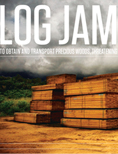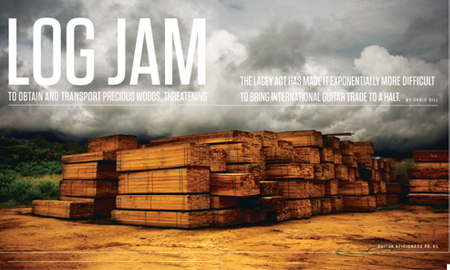Log Jam


Originally published in Guitar Aficionado, Spring 2010
The Lacey Act has made it exponentially more difficult to obtain and transport precious woods, threatening to bring international guitar trade to a halt.
On November 17, 2009, agents from the U.S. Fish and Wildlife Service (FWS) raided the Gibson guitar factory in Nashville. Based on allegations made in a sealed affidavit, the FWS was convinced that Gibson was using rosewood and ebony harvested illegally from Madagascar. The agents seized company computers as well as guitars and wood. The event sent shockwaves through the guitar manufacturing industry, not least because of Gibson’s reputation as an environmentally responsible and conscientious producer of guitars that steadfastly adhered to Forest Stewardship Council (FSC) certification and requirements. Gibson Guitar Chairman and CEO Henry Juszkiewicz even served on the board of the Rainforest Alliance, an organization dedicated to the preservation of tropical forests.
Although the investigation is ongoing and Gibson hasn’t been convicted of any wrongdoing, the raid sent a harsh warning to companies that purchase raw wood materials. In the recent past, government officials probably wouldn’t have bothered to investigate the allegations, but on May 22, 2008, the U.S. Congress passed an amendment to the Lacey Act, a piece of legislation dating back to 1900 that was originally written to protect wildlife. The amendment expanded the act’s protection measures to include certain varieties of plants and plant products, namely wood. Gibson became the first major U.S. manufacturer to be investigated after the changes went into effect.
“The way that the law is written, it’s illegal to import, export, or engage in the trade of any wood if that activity violates the law of your country or any other country,” explains Bob Taylor, the cofounder and president of Taylor Guitars. “The good thing about the act is that it should help to curtail a lot of illegal logging. The bad thing is that the law is insufficiently written and insufficiently [taught] down to the enforcement level. When you have enforcers who really don’t know what they’re looking for, that can cause a lot of problems for everyone, from large guitar companies to musicians who travel internationally with their instruments.”
The 2008 amendment takes a significant step toward protecting tonewood sources from becoming endangered or even totally wiped out. Since 1975, endangered species of flora and fauna have been protected by the CITES Treaty (CITES is an acronym for the Convention on International Trade in Endangered Species of Wild Fauna and Flora), which safeguards more than 33,000 species of animals and plants. The amended Lacey Act, however, covers an even broader scope than CITES. Now guitar builders must ensure that the woods they use comply not only with the laws of their own country but also with the laws of the country where the wood originated and where the finished guitar may end up being shipped.
“The Lacey Act requires more due diligence on the part of the receiver of the wood than there was in the past,” Taylor says. “We can’t just take someone’s word that the wood we’re buying is legit; we’re going to need to get on the plane, bus, boat, and donkey to take a close look at operations and the source. Even if your act was already clean, you’re going to have to clean it up even more.”
All the latest guitar news, interviews, lessons, reviews, deals and more, direct to your inbox!
Guitar makers have already felt the new law’s impact. “The Lacey Act has imposed very strict rules concerning the importation of guitars into other countries,” says Stefan Sobell, who has been building fine guitars from rare and exotic tonewoods in England since 1975. “Each country has different rules. The act allows for the importation of woods as long as they’re certified as legal in their countries of origin. Certification in England is very clear and strict. But once it’s certified here, I’m not certain if it’s certified in the United States. There isn’t a consistent policy in force in the U.S. yet. For the time being, it looks like I may not be able to ship guitars to there, and because the U.S. is a major market for me, this is a blow to my customers as well as a threat to my livelihood.”
Taylor stresses that guitar companies and builders who deal exclusively with legally harvested wood should be okay as long as the materials are accompanied by the proper paperwork. But the problem for many builders, particularly small specialists like Sobell, is that their guitars are built from stockpiles of wood that they have stored and aged for many years. Often, the proper paperwork to verify the legitimacy of those woods doesn’t exist and never did.
“So much old timber that is ideal for making guitars is out there and still available,” Sobell says. “All of the Brazilian rosewood and other CITES-restricted woods that I use to build guitars are ethical and legal. But while it’s both ethical and legal to make a guitar using that wood, the Lacey Act has made it virtually impossible for me to use it. Most of my timber is decades old. I gathered it years ago to allow it to air dry and improve with aging. There’s no way I can trace any of it back to any particular region, let alone a particular logging camp. If this sort of information is required by Lacey, most luthiers are going to have a very big problem.”
Bob Taylor believes that U.S. government authorities will focus primarily on big companies, but both Sobell and Richard Hoover of the Santa Cruz Guitar Company express concerns that musicians who travel with instruments and retailers who ship guitars overseas may come under increased scrutiny as well, regardless of whether those instruments are vintage, used, or new.
“Vintage dealers should be absolutely terrified of the Lacey Act,” Hoover says. “If you’re shipping a 1950s Martin D-28 into Japan, no one knows what kind of documents you’re going to need to prove that the guitar is legit. I know of no way to come up with documentation that would protect even a new guitar owner from conditions of the Lacey Act. When people ask me for those documents, I don’t even try to provide them. I know I could pay money to get those documents, but that’s basically the equivalent of paying a bribe.”
Brian Wolfe of Acoustic Music, a retail instrument store in Guilford, Connecticut, can attest that the Lacey Act has made the paperwork process much more confusing when shipping an instrument internationally. Wolfe says that he used to list the country of origin for a pre-1969 Martin D-28 as “the United States,” because that’s where the guitar was made. Now, under the Lacey Act, he’s required to list each individual country where the raw materials originated.
“I now have to claim that the rosewood is from Brazil and the Adirondack or Sitka spruce is from Canada or the U.S.,” Wolfe says. “I don’t even know what country to designate for the ebony, since it could have come from a variety of countries in Africa, some of which don’t even exist any more. If I can’t verify any of this information or if I make an honest mistake, the guitar may be subject to inspection, and without the appropriate documentation the instrument could end up being confiscated or destroyed.”
With the exception of the FWS raid on Gibson, which focused on Madagascar rosewood and ebony, the only types of woods that have attracted attention from government authorities in the U.S. and abroad so far have been those that are protected by CITES, like Brazilian rosewood and Honduras mahogany. Taylor knows of a few instances in which a company’s guitar shipments were seized by customs offi cials on suspicion that they were made of Brazilian rosewood. The officials then sawed into the guitars to determine what woods were used. Taylor thinks such measures will become more commonplace if companies fail to provide proper documents with their shipments. “Customs agents will certainly be looking out for particular species of woods as a result of the Lacey Act,” he says. “There’s a high alert on several varieties of woods now, so they’ll be doing what you could call ‘species profiling.’”
However, because it can be difficult to determine a wood’s species and origin just by examining it, Hoover argues that officials will have great difficulty proving that a wood is in violation of the Lacey Act. The drawback is that the burden of proof now lies upon the party making the shipment. He says, “Without components of the tree, like seed cones, pine needles, and leaves, nobody outside of a handful of experts knows how to precisely identify a wood. I can identify Brazilian rosewood by how it looks and smells, but there is no DNA test that can absolutely prove it is Brazilian rosewood.”
- For all the amendment’s hassles and potential for problems, most guitar builders feel it’s a big step in the right direction. While most companies and consumers were already aware of the environmental issues of illegal logging, few were conscious of the political and social issues that often accompany the practices. Some inhabitants of tropical rainforests may rely on the
- meager incomes that they make from selling illegally harvested wood, but often those people are exploited by others who make even bigger profits off of their labor and use the funds to buy military arms or engage in drug trade. Corrupt governments in third-world countries often lift logging and export restrictions so they can exploit their natural resources and raise funds, but these practices have threatened to wipe out entire forests and species of woods.
Hoover says, “Madagascar rosewood was once considered an environmentally responsible alternative to Brazilian rosewood. Unfortunately, it became artificially available and abundant, due to political turbulence there. Often, when you realize the reality of the situation, it’s too late to save the resource. Some wood can follow a ‘food chain’ that you don’t want to have anything to do with. You really need to realize what’s being funded by the money you spend on wood. That’s why I now get very little wood out of Africa.”
Taylor counters that Madagascar remains a viable source. “Plenty of Madagascar rosewood is harvested legally. The main problem is that 90 percent of the wood there has been cut down. We’ve cut down a lot of trees in North America too, but we’ve also grown a lot of trees. Many reputable suppliers grow, manage and replenish their own forests, and they’ve been doing that for many years. Authorities will be paying closer attention to shipments of Madagascar rosewood as they make their way from Africa to a supplier in Germany to a manufacturer in the United States.
“There’s nothing wrong with commerce as long as it’s conducted in a responsible manner,” he adds. “As long as the wood is accompanied by the proper paperwork, it will be made into a guitar anyone can sell and export.”
While collectors of fine guitars may find it difficult in the coming months and years to purchase a new guitar made by their favorite European boutique builder or a vintage instrument from an overseas dealer, most remain optimistic that the problems will be temporary. A few critics have argued that the Lacey Act is a protectionist strategy to limit trade outside of the United States, but economists argue that such a move could further damage the already precarious state of the American economy.
“We’re living through a time of transition from one type of economy to another economy,” Taylor says. “Many builders view the Lacey Act as flawed and more trouble than it’s worth. We’re at a tricky in-between stage, but the situation will become easier again in the future once we know what the rules are. We should embrace it and go with the flow instead of trying to fight what we can’t change. If it’s good, we should see what we can do to make it better. This is just one more step toward working in a global world with a global mindset. Hopefully we can build some great guitars and do some good along the way.”
